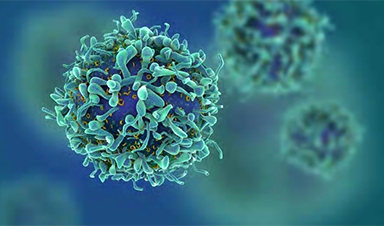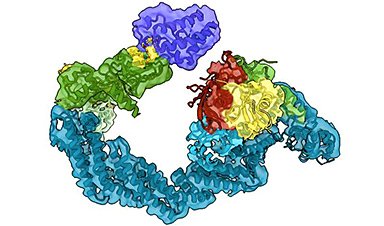| In recent years, the number of targeted cancer drugs has continued to rise. However, conventional chemotherapeutic agents still play an important role in cancer treatment. These include platinum-based cytotoxic agents that attack and kill cancer cells. But these agents also damage healthy tissue and cause severe side effects. | |
| Researchers at ETH Zurich have now identified an approach that allows for a more selective cancer treatment with drugs of this kind (Angewandte Chemie, “Peptide-Coated Platinum Nanoparticles with Selective Toxicity against Liver Cancer Cells”). | |
| Platinum can be cytotoxic when oxidised to platinum(II) and occurs in this form in conventional platinum-based chemotherapeutics. Non-oxidised platinum(0), however, is far less toxic to cells. Based on this knowledge, a team led by Helma Wennemers, Professor at the Laboratory of Organic Chemistry, and Michal Shoshan, a postdoc in her group, looked for a way to introduce platinum(0) into the target cells, and only then for it to be oxidised to platinum(II). | |
| To this end, they used non-oxidised platinum nanoparticles, which first had to be stabilized with a peptide. They screened a library containing thousands of peptides to identify a peptide suitable for producing platinum nanoparticles (2.5 nanometres in diameter) that are stable for years. |
Image Credit: Shutterstock
News This Week
The Global Nanomedicine Market: Key Players and Emerging Technologies in Healthcare
This article provides an overview of the global nanomedicine market, highlighting key players, emerging technologies, and the challenges and opportunities that influence its growth and commercialization in the healthcare sector. Nanomedicines are nanotechnology-based drug products [...]
Scientists Have Discovered Toxic “Forever Chemicals” in Bottled Water
Scientists have found toxic PFAS in drinking water samples from around the world, with higher levels in tap water from China compared to the UK. Boiling water or using a filtration jug can reduce [...]
Urban Microbes Are Eating Disinfectants – Are We Fueling a New Health Threat?
New research reveals that microbes in urban environments are evolving to withstand the very cleaning agents designed to eliminate them. The study also uncovers new strains in Hong Kong, previously only found in the [...]
Startling Study Shows High-Potency Cannabis Alters DNA
The study shows that frequent use of high-potency cannabis alters DNA, affecting genes related to energy and immune function. These changes differ between those with and without psychosis, suggesting cannabis use could influence mental health through biological [...]
New nanotherapy targets artery inflammation in cardiovascular disease
Inflammation of the arteries is a primary precursor and driver of cardiovascular disease—the No. 1 killer of people in the United States. This inflammation is associated with the buildup of dangerous plaque inside the [...]
Revolutionary Nanoparticle Therapy for Prostate Cancer
A groundbreaking research effort involving teams from the University of Virginia, Mount Sinai, the University of Michigan, the University of Texas, and others has displayed the clinical efficacy of an innovative therapy that utilizes nanoparticles and [...]
Antibody engineering drives innovation in drug development
Monoclonal antibodies (mAbs) are used to prevent, detect, and treat a broad spectrum of non-communicable and communicable diseases. Over the past few years, the market for mAbs has grown exponentially with an expected compound [...]
Breakthrough Study Reveals How Bladder Cancer Starts and Spreads
Researchers found that DNA mutations from antiviral enzymes and chemotherapy fuel early bladder cancer, while abnormal circular DNA in tumor cells drives resistance to therapy. These discoveries open new therapeutic avenues. A groundbreaking study led by [...]
AI and Quantum Mechanics Accelerate Drug Discovery
A recent article published in the Journal of Chemical Information and Modeling researchers at Southern Methodist University (SMU) have developed SmartCADD, an open-source virtual tool designed to speed [...]
Targeting ‘undruggable’ diseases: Researchers reveal new levels of detail in targeted protein degradation
Researchers at the University of Dundee have revealed in the greatest detail yet the workings of molecules called protein degraders which can be deployed to combat what have previously been regarded as "undruggable" diseases, [...]
Revolutionizing Virology: AI Discovers Over 160,000 New RNA Viruses
Largest discovery of new virus species sheds light on the hidden virosphere. Artificial intelligence (AI) has been used to reveal details of a diverse and fundamental branch of life living right under our feet and in every [...]
Cardiac Crisis: COVID-19 Doubles Risk of Heart Attacks, Strokes, and Death
Research indicates that COVID-19 survivors face doubled risks of severe cardiac events for years after recovery, especially if hospitalized. People with A, B, or AB blood types are particularly vulnerable, highlighting the need for personalized approaches [...]
AI steps into science limelight with Nobel wins
For long periods of its history, artificial intelligence has lurked in the hinterland of science, often unloved and unfunded—but two Nobel prizes in one week suggest its time in the sunshine has finally arrived. [...]
MIT Scientists Shed New Light on the Critical Brain Connections That Define Consciousness
A new study provides further evidence that consciousness depends on communication between the brain’s sensory and cognitive regions in the cortex. Our brains are constantly making predictions about our surroundings, enabling us to focus [...]
Common Chemicals Found in Shampoo and Plastic Could Be Quietly Disrupting Your Heart’s Rhythm
UC study of Fernald data links environmental phenols to heart toxicities Environmental phenols are present in numerous everyday consumer products, serving as preservatives in packaged foods, parabens in shampoos, and bisphenol A (BPA) in [...]
Revolutionary Brain Tech Offers New Hope for Stroke and Injury Recovery
University of Pittsburgh researchers report that deep brain stimulation (DBS) can effectively enhance motor functions in individuals with arm and hand paralysis due to brain injuries, with promising results from early human and monkey [...]























Leave A Comment